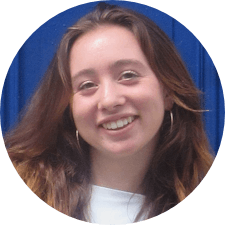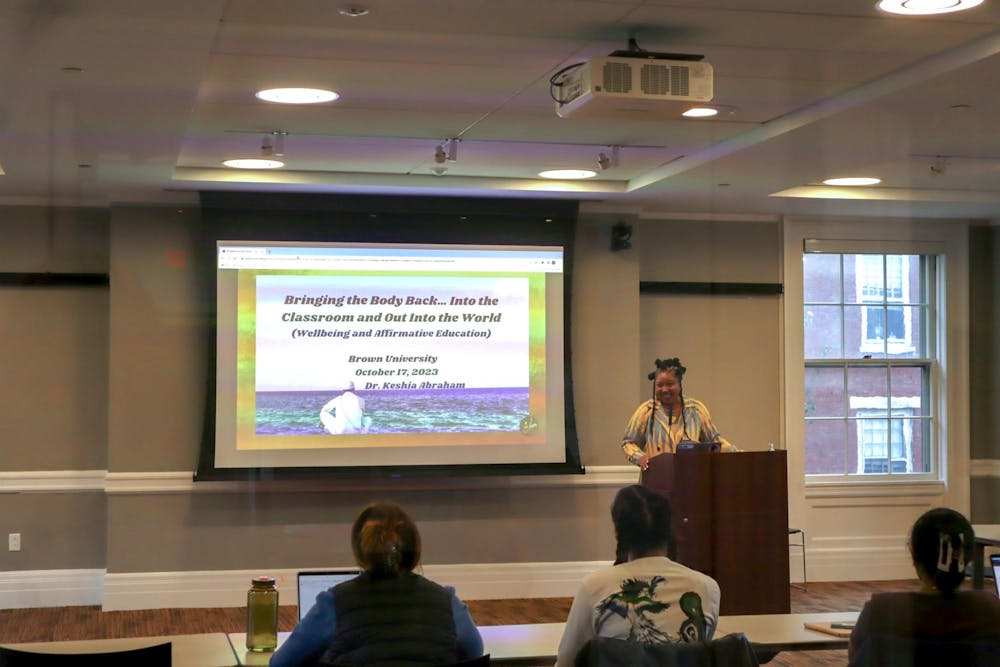The first time Keshia Abraham and her mother visited her younger brother in high school, they were brought to the principal’s office to discuss his attention problems.
While at the school, Abraham discovered that her brother was “putting on a performance” by sitting with his feet in the air and his head on the seat. This was his way of finding alternative ways to absorb information in class because teachers “were not teaching in a way that spoke to who he was,” Abraham told the audience attending the first session of the Global Brown Center for International Students speaker series on Oct. 17.
Throughout her talk, Abraham challenged educational norms: Learning should be a source of “joy and light,” and students finding their own comforts “is not the enemy of learning,” she said.
Abraham, who was previously a professor at Florida Memorial University, is now the president and founder of Abraham Consulting, an agency that helps “organizations and institutions engage global learning with justice, equity, diversity and inclusion standards so robust and deeply entrenched that we change the way we see the world and ourselves in it,” according to the Abraham Consulting website.
“I use my agency to advance justice and equity with dignity and intention through global learning and wellbeing, especially for the African diaspora, while helping others recognize and utilize the power of their agency,” Abraham’s website states.
Abraham’s session was part of a larger speaker series organized by Andrew Heald, the GBC's program director. Heald was first introduced to Abraham’s work, which aims to connect the body and higher education, at a GBC retreat.
“I thought that it would be a really valuable conversation for the campus to have,” Heald said. “We talk about wellness and we try to practice wellness, but sometimes it’s difficult to center yourself.”
Seated around a U-shaped table, each attendee at the workshop session engaged in interactive tactics to improve their individual wellness. After her anecdote, Abraham checked in with each participant.
Some responses from attendees included “surviving,” “not well-rested” and “confused and disconnected.” With each response, Abraham reminded attendees to check in with themselves by practicing their breathwork.
Abraham discussed two conceptual frameworks that she has introduced into educational spaces. She began with the concept of justice and equity with dignity and intention, with the hope that “everybody feels a sense of joy and equity in their learning experience.” Abraham also brought another framework into her session: appreciate, see, hear, engage and embody.
She then offered a selection of pieces participants could read to explore the importance of the self and the connection between mind and body, including the poem “Discourse on the Logic of Learning” by M. NourbeSe Philip, the collection “Sister Outsider” by Audre Lorde and the novel “Nervous Conditions” by Tsitsi Dangarembga.
Between each section, Abraham returned to the importance of breathwork as a way of using “the body for good.”
At the end of the workshopping session, Abraham returned to the story of her brother, who she said used his body to expand his learning experience in high school. Now, Abraham said, her brother is an award-winning dancer and choreographer, designing dances for artists and groups ranging from Beyoncé to the New York City Ballet.
The next session in the GBC speaker series is set to take place in November. Heald has not yet released details, but he said that “one of the goals moving forward is to find more opportunities to engage with outside scholars, activists and students from our broader community.”

Hadley Carr is a university news editor at The Herald, covering academics & advising and student government.





